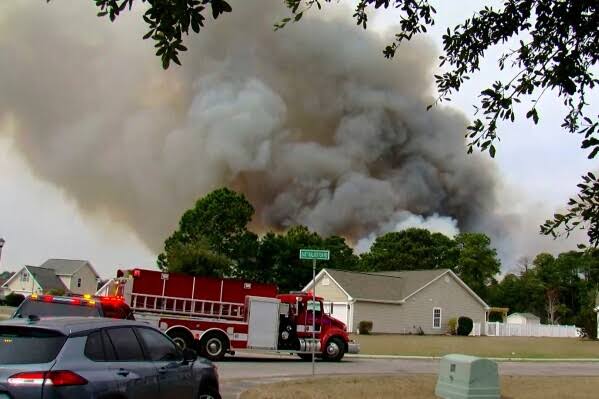In recent days, the communities surrounding Myrtle Beach and Carolina Forest have found themselves grappling with the harsh realities of wildfires that have spread across the region. The fires, fueled by extreme heat and dry conditions, have caused widespread destruction, displacing families and threatening the delicate ecosystem of the area. For many, this disaster is a painful reminder of the unpredictable and devastating nature of wildfires, especially in areas where such events have been relatively rare in recent history.
Myrtle Beach, known for its vibrant tourist economy and beautiful coastal views, has experienced significant disruption as flames have reached areas not typically associated with fire hazards. The fire’s reach has extended far beyond the city limits, impacting the neighboring communities of Carolina Forest. This once-peaceful suburban area, home to thousands of residents, now finds itself in a state of emergency. The damage to homes and businesses, combined with the threat to local wildlife, has created a somber atmosphere throughout the region.
One of the most heartbreaking consequences of these fires is the loss of wildlife that depends on the natural habitats in the area. Myrtle Beach and the surrounding forests are home to a rich variety of animals, from deer and wild turkeys to smaller creatures like rabbits and squirrels. As the flames advance, these animals are forced to flee their homes, with many unable to escape in time. The destruction of natural habitats not only puts wildlife at risk but also disrupts the local ecosystem, leaving lasting effects on the region’s biodiversity.
In response to the fires, local authorities have issued evacuation orders, urging residents to prioritize their safety and leave their homes. Many families have been forced to abandon everything, leaving behind homes, businesses, and treasured memories. Shelters have been set up, and relief efforts are underway, but the psychological toll on those affected is undeniable. As evacuees seek refuge in safer areas, the anxiety of not knowing the full extent of the damage to their homes and livelihoods lingers.
The impact of these fires extends beyond the immediate loss of property and wildlife. The region’s economy, particularly in Myrtle Beach, relies heavily on tourism. With roads closed, businesses evacuated, and attractions shut down, the local economy is facing severe strain. It will take time for the area to recover, both financially and emotionally. In the meantime, the focus must remain on the well-being of those affected and on the urgent need for support from both local and national communities.
As the fires continue to burn and recovery efforts intensify, it is important to remember the resilience of the people and wildlife of Myrtle Beach and Carolina Forest. These communities have weathered storms before, and they will rebuild from this disaster as well. However, this moment calls for solidarity, support, and compassion. Whether through donations to relief organizations, volunteering time, or simply spreading awareness, every act of kindness can help ease the burden during this challenging time.
If you or someone you know is impacted by the fires, our thoughts are with you. Let us all keep the affected families, first responders, and volunteers in our minds and prayers as they navigate the devastation caused by these wildfires. The road to recovery will be long, but together, we can help rebuild and restore this cherished part of South Carolina.


